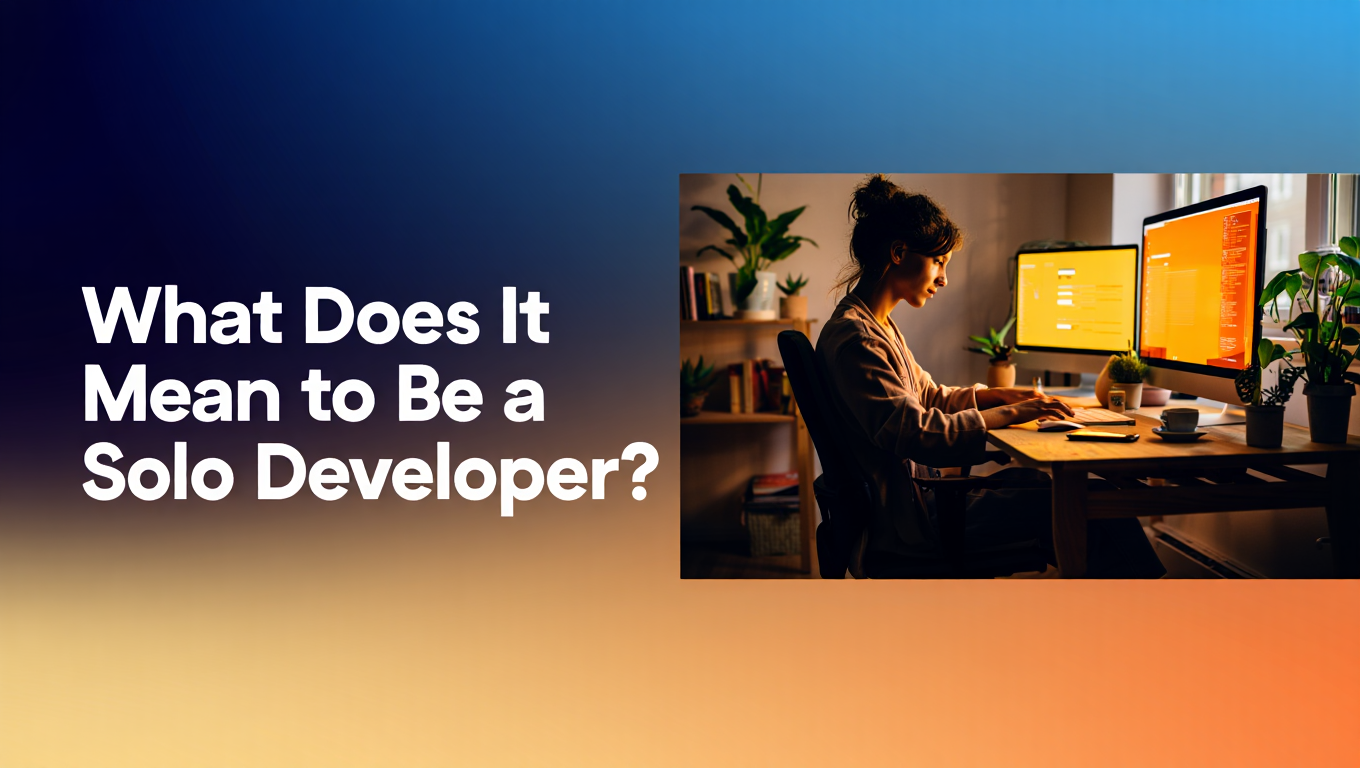What Does It Mean to Be a Solo Developer?
The reality of building alone freedom, decision fatigue, loneliness, and why I'd still choose it. Here's what no one tells you about solo development.

You're the designer, the developer, the DevOps engineer, and somehow you're also writing marketing copy at midnight.
That's what it means to be a solo developer.
I've been building products alone for the past three years. No team, no co-founder, no safety net. Just me, my code editor, and an endless backlog of decisions only I can make. Some days it feels like freedom. Other days it feels like drowning.
Here's the reality no one talks about.
Why Most People Misunderstand Solo Development
People think solo development means you work alone and ship faster.
That's half true.
Yes, I work alone. But faster? That depends on what you're measuring. I can make decisions in seconds that would take a team hours of meetings. But I also spend entire weekends implementing features that a specialized frontend developer could knock out in an afternoon.
The biggest misconception is that going solo means total freedom.
It doesn't.
It means total responsibility. Every bug is yours. Every design choice is yours. Every 3 AM server crash is yours to fix. There's no one to hand off to, no one to blame, no one to cover for you when you need a break.
Freedom sounds romantic until you realize it comes with a permanent on-call schedule.
What Solo Development Actually Looks Like Day-to-Day
My typical Tuesday..
I start with backend work fixing an authentication bug that's been nagging me. Thirty minutes in, I notice the UI for the login form looks terrible on mobile. So I switch to CSS. While I'm there, I realize the error messages are confusing, so I rewrite the copy. Then I remember I need to update the deployment pipeline because the staging environment broke yesterday.
By lunch, I've touched four completely different domains and finished exactly zero of them.
This is the reality of solo development. Context switching is the job.
You don't get to specialize. You don't get to say "that's not my department." When you're a team of one, everything is your department. Database optimization, UI polish, customer support, SSL certificate renewals, social media, tax paperwork all of it lands on your desk.
Most developers on teams spend 80% of their time coding. Solo developers? I'd estimate I spend 40% coding and 60% on everything else. And that's on a good week.
The Decision Fatigue Is Real
Every single choice is yours to make.
Should you use Postgres or MySQL? Tailwind or custom CSS? Deploy on Railway or Fly.io? Charge monthly or annually? Launch now or add that one more feature? Respond to that customer email now or finish this bug fix first?
I make approximately 200 micro-decisions per day. And unlike a team where you can defer to someone with more expertise in a specific area, every decision requires you to research, evaluate, and commit.
By 6 PM, I'm mentally exhausted not from writing code, but from deciding what code to write, how to write it, where to deploy it, and whether it even matters.
This is what people don't tell you about autonomy. It's not just freedom to choose. It's the burden of choosing everything, all the time, with no one to validate your decisions until users start complaining (or don't show up at all).
The paradox.. the freedom to do anything often leads to paralysis about what to do next.
The Loneliness Hits Different
I thought I'd enjoy the solitude.
I'm an introvert. I hate meetings. I love deep work. Solo development should be perfect for me, right?
Turns out, there's a difference between choosing to work alone and having no choice but to work alone.
When you're on a team, you can slack someone when you're stuck. You can rubber duck a problem with a coworker. You can celebrate wins, even small ones, with people who understand what you built.
When you're solo, you ship a feature and... silence. You fix a gnarly bug and no one knows. You hit a milestone and there's no one to high-five except your reflection in the monitor.
The work itself isn't lonely. It's the lack of shared context.
I've had weeks where the only human interaction was customer support emails and a grocery store cashier. That's not sustainable. I've learned to be intentional about community online forums, local meetups, even just coworking at a coffee shop. Without that, the isolation compounds.
But Here's Why I Still Choose It
Despite everything I just said, I'd make the same choice again.
Because the alternative building on someone else's timeline, with someone else's priorities, using someone else's tech stack feels worse.
When I ship a feature, I know every line of code. When something breaks, I know exactly where to look. When I need to pivot, I don't need to convince a team or negotiate priorities. I just do it.
I've deployed 12 projects in three years. Some failed. Some are still running. But every one of them taught me something a team environment never could.. how to make trade-offs when there's no one else to lean on.
That skill is worth the decision fatigue.
The autonomy is worth the loneliness.
The freedom to build what I think is worth building even if it's wrong is worth the lack of specialization.
What Actually Makes Solo Development Work
You can't do everything, but you can automate the hell out of what doesn't need your brain.
I spent two weeks building a deployment pipeline that now saves me 3 hours per release. I use pre-built UI components instead of designing from scratch. I bought a course on copywriting instead of pretending I'm good at marketing. I pay for tools that cost $20/month but save me 10 hours.
Time is the bottleneck, not money. Once you internalize that, solo development becomes viable.
The second thing that makes it work.. lowering your standards in the right places.
Your landing page doesn't need to be perfect. Your database schema doesn't need to handle a billion users on day one. Your code doesn't need to follow every best practice. Ship it, see if anyone cares, then iterate. Perfection is a team luxury. Solo developers optimize for shipping.
The third thing.. accepting that you'll be mediocre at most things.
I'm a decent backend developer. I'm a passable frontend developer. I'm a terrible designer. I'm okay at marketing. That's fine. You don't need to be exceptional at everything. You just need to be competent enough to ship, and smart enough to know when to pay someone who's actually good.
What You Should Know Before Going Solo
If you're considering solo development, here's what I wish someone had told me..
You will be slower than a team. Accept it now. A team of three ships faster than you. That's not a failure it's physics. But you'll also have zero coordination overhead, which means you can move in ways teams can't.
You will learn everything the hard way. There's no senior developer to review your code. No designer to tell you that gradient is hideous. No PM to tell you that feature doesn't matter. You'll make mistakes. Expensive ones. That's part of the deal.
You will question if it's worth it. At least once a month, you'll wonder if you should just get a job. That's normal. The question isn't whether the doubt shows up it's whether you keep building anyway.
But also.. you will build things that wouldn't exist otherwise. Things too niche for a company to care about. Things too weird for a team to approve. Things that only make sense to you and the twelve people who actually need them.
And honestly, that's the whole point.
What Actually Matters
Here's what being a solo developer really means..
- You own the entire stack from idea to deployment to customer support. There's no hiding behind "not my job."
- You trade specialization for autonomy you'll never be the best at any one thing, but you'll control everything.
- You'll be lonely, but not isolated if you're intentional about community, you can build support networks that work for you.
Start here..
If you're thinking about going solo, build one small project end-to-end. Something you can ship in a weekend. Not to make money just to feel what it's like when every decision is yours. If that feels energizing instead of draining, you'll know.
And if it feels draining? That's valuable information too.
Solo development isn't for everyone. But for the right person, it's the best worst job you'll ever have.
